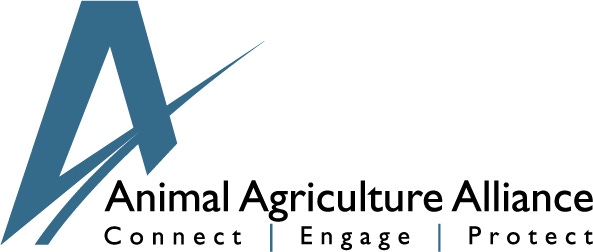Animal Agriculture Alliance reports detail 2022 activist agendas
More persistent in pressuring restaurant, retail and foodservice customers, targeting public with misleading emotional campaigns and using the legal system.
December 1, 2022

The Animal Agriculture Alliance has concluded its release of reports from five prominent animal rights extremist conferences held over the course of 2022. The conferences included: Humane Society of the United States' Taking Action for Animals Conference (held July 16-17), The Rancher Advocacy Program's Summit (held July 30), Animal Place's Farmed Animal Conference E-Summit (held Sept. 16-18), Animal Legal Defense Fund's Animal Law Symposium (held Sept. 24), and ALDF and the Center for Animal Law Studies' Animal Law Conference (held Nov. 4-6).
The key claims and takeaways from these events included the following: animal rights activists aim to advance the interest of animals through the legal system by utilizing "undercover videos" as evidence in court; activists believe the marketing of plant-based products and promotion of animal rights needs to speak to the emotions of the consumer rather than the intellectual messaging that currently compares alternatives to meat, milk, poultry and eggs; and activists are pressuring elected officials to include animal rights in their political campaigns in order to bring their cause to the legislature.
"Animal rights extremist organizations are becoming increasingly more persistent in attacking the animal agriculture community through various channels, including pressuring our restaurant, retail and foodservice customers, targeting the public with misleading emotional campaigns and using the legal system," said Hannah Thompson-Weeman, Alliance president and CEO. "Releasing reports from major activist conferences allows our members and the broader animal agriculture community to be well-informed of emerging tactics so that they can take steps to safeguard their livelihoods from potential extremist threats."
At several of the conferences, animal rights activists were encouraged to involve themselves more politically to bring attention to the movement. Connie Spence, founder of the Agriculture Fairness Alliance, stated at the RAP Summit, "Why are we not telling our own to literally run for a position? We are so intelligent at the breadth of detail that we have to give when it comes to our full story about veganism."
Jane Velez-Mitchell, founder of UnchainedTV, countered Spence's suggestion by claiming that a more aggressive approach would be the only way to get through to legislators. She added, "How do we appeal to them? One is money and one is fear."
Assemblyman Dan Benson of New Jersey's 14th District echoed Spence's statement to attendees at ALDF's Animal Law Conference by asserting, "You have got to run for office. You've got to work on campaigns ... it is another way groups can really get the ear of staff." He also encouraged attendees to be present during both the legislative and budgeting sessions of the legislature. While only the former session can pass laws, Benson reminds attendees to "never forget, funding drives a lot of the policy," insinuating that activists should push for the funding of projects that would further the interests of the animal rights movement.
Several sessions from the conferences focused on consumer outreach and the strategic marketing of the animal rights movement. Miyoko Schinner, founder and CEO of Miyoko's Creamery, spoke at ALDF's Animal Law on using more emotional tactics to promote plant-based foods, stating stated, "I have been a vegan for almost 40 years, and my whole life has been around activism through food, and that's really how I’ve tried to touch people—trying to reach their hearts through their stomachs."
Monica Chen, executive director of the Factory Farming Awareness Coalition, explained to FACES attendees that this tactic can also be brought to the classroom. She stated, "When we do our lessons, we target the audience's emotions by creating a story about the suffering and destruction that factory farming causes, and students are now primed for us to help them connect the story of factory farming to the story of who they are." By targeting children, Chen adds that these lessons taught early in childhood development help to "foster the social disapproval around the consumption of animal products while normalizing plant-based foods."
Extremist groups continue to rely on "undercover videos" to bring attention to their cause, as discussed in various conference sessions. At HSUS' TAFA Conference, Sharon Nunez, president of Animal Equality, stated, "[Undercover] investigations are a foundational aspect of our work as we bring light to the darkness of factory farming." She added that in the eyes of the animal rights community, there is "nothing more powerful" or as revered as an "undercover investigator."
Mimi Brody, director of federal affairs for the Humane Society Legislative Fund, echoed this thought, rallying attendees to "break through and garner attention on Capitol Hill. A compelling undercover investigation and resulting media coverage can make all the difference."
Caitlin Foley, staff attorney for Animal Legal Defense Fund, told attendees at ALDF's Animal Law Symposium, "Our job as animal lawyers and advocates is to use the industry's misdeeds as an opportunity to talk about what they're doing and sensitize the public to what this industry really is all about." She encouraged supporters to utilize social media to reach consumers with these videos and use them as tools to convince viewers to eliminate meat, milk, poultry and eggs from their diets. She added, "Media attention to animal welfare has negative effects on the demand for meat, so increasing media attention to animal welfare issues triggers consumers to actually purchase less meat, rather than reallocate expenditures to competing products."
All 2022 animal rights activism conference reports, which include personal accounts of speaker presentations and general observations, are available to Alliance members in the Resource Center on the Alliance website. The Alliance website also includes reports from previous years' animal rights conferences.
Source: Animal Agriculture Alliance, which is solely responsible for the information provided, and wholly owns the information. Informa Business Media and all its subsidiaries are not responsible for any of the content contained in this information asset.
You May Also Like



